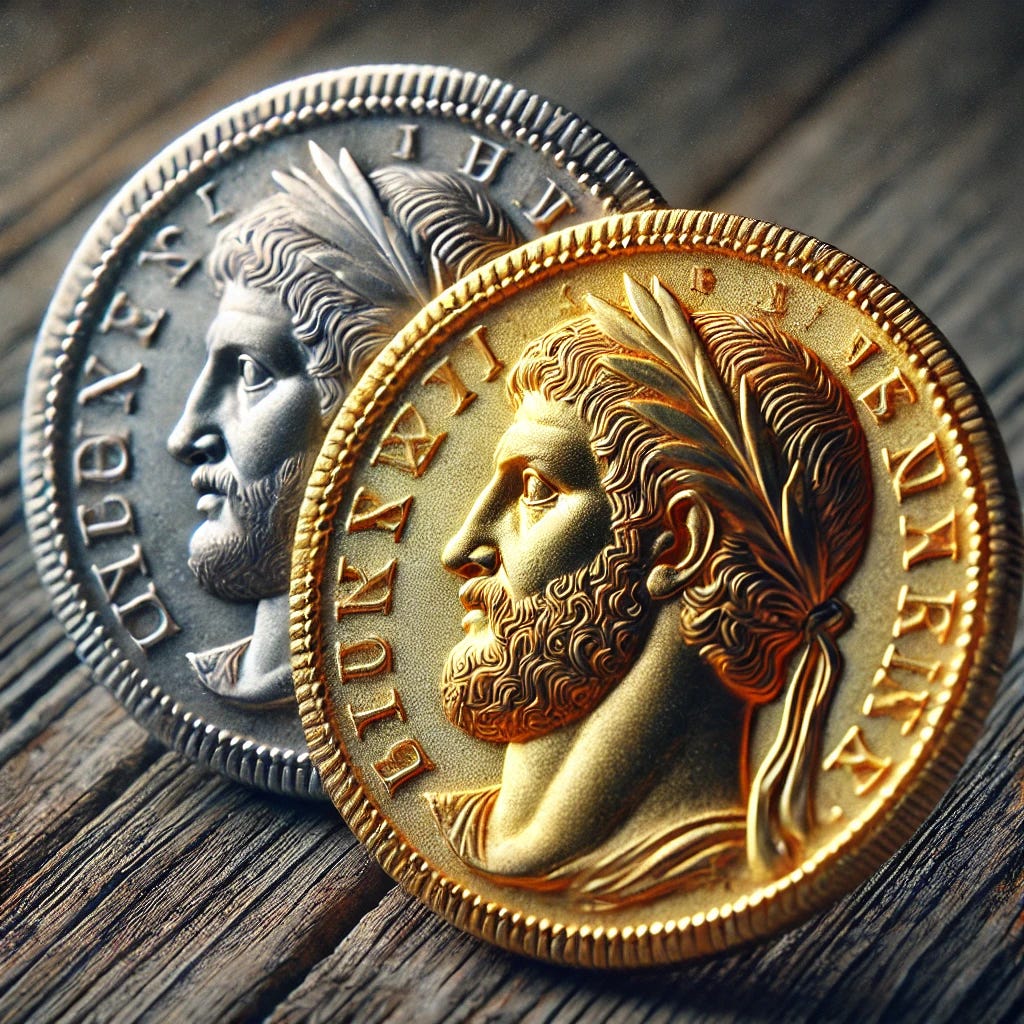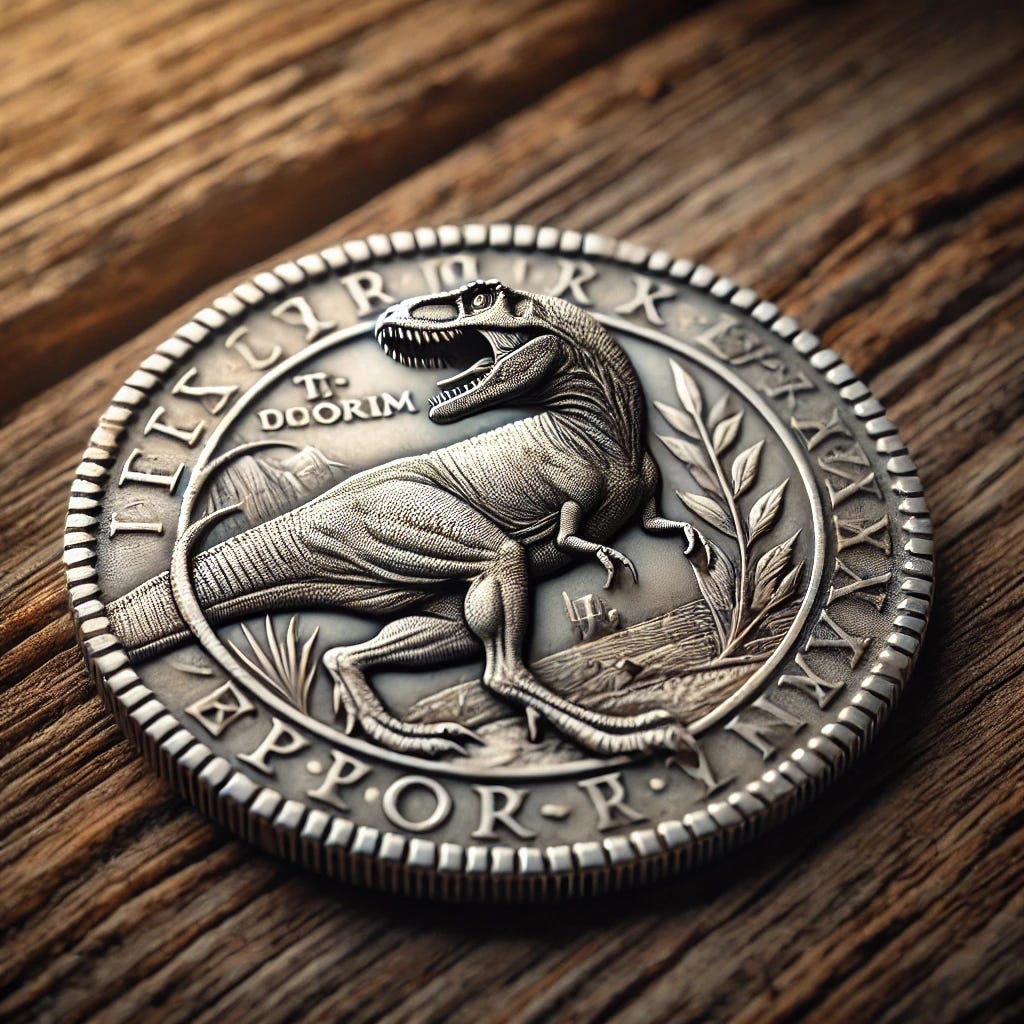Gold vs. Silver Dinarei
There was something strange in a recent brayta, Bava Batra 165b:
תָּנוּ רַבָּנַן: ״דְּהַב״ – אֵין פָּחוֹת מִדִּינָר דְּהַב. ״דְּהַב דִּינָרִין״ וְ״דִינָרִין דְּהַב״ – אֵין פָּחוֹת מִשְּׁנֵי דִינָרִין דְּהַב. ״דְּהַב בְּדִינָרִין״ – אֵין פָּחוֹת מִבִּשְׁנֵי דִינָרִין כֶּסֶף, דְּהַב.
The Sages taught in the continuation of the baraita: If it is written in a document that someone owes gold, the amount must be no less than a golden dinar. If it is written: Golden dinars, or: Dinars golden, the amount must be no less than two golden dinars. If it is written: Gold, in dinars, the amount must be no less than two silver dinars’ worth of gold.
The word דהב with a daled is Aramaic, the cognate of the Hebrew זהב. Essentially, there was a third sound besides /z/ and /d/, namely the /th/ of “either”, which was mapped onto the daled letter in Aramaic and the zayin letter in Hebrew. But we should expect our braytot to be in Hebrew, no?
Especially since this brayta is a contrast to one that seems to be all in Hebrew, speaking about silver rather than gold, that appeared just above:
תָּנוּ רַבָּנַן: אָמַר ״כֶּסֶף״ – אֵין פָּחוֹת מִדִּינָר כֶּסֶף. ״כֶּסֶף דִּינָרִין״ וְ״דִינָרִין כֶּסֶף״ – אֵין פָּחוֹת מִשְּׁנֵי דִּינָרִין כֶּסֶף. ״כֶּסֶף בְּדִינָרִין״ – אֵין פָּחוֹת מִבִּשְׁנֵי דִינָרִין דְּהַב, כֶּסֶף.
GEMARA: The Sages taught (Tosefta 11:2): If a document states that someone owes silver, without specifying which silver coin, the amount must be no less than a silver dinar. If it states: Silver dinars, or: Dinars silver, the amount must be no less than two silver dinars, the lowest amount to which that phrase can refer. If it states: Silver, in dinars, the amount must be no less than two golden dinars’ worth of silver.
Except this is not really a proof, since the word כסף does appear as a plain Aramaic word as well, so nothing orthographic tells us that this is not Hebrew.
In terms of pronunciation, sure, we could turn to Daniel 2.32:
ה֣וּא צַלְמָ֗א רֵאשֵׁהּ֙ דִּֽי־דְהַ֣ב טָ֔ב חֲד֥וֹהִי וּדְרָע֖וֹהִי דִּ֣י כְסַ֑ף מְע֥וֹהִי וְיַרְכָתֵ֖הּ דִּ֥י נְחָֽשׁ׃
The head of that statue was of fine gold; its breast and arms were of silver; its belly and thighs, of bronze;
and see that the vowel pattern of sheva patach rather than segol segol for this segholate.
Similarly, when reading the ketuba, especially where they have the word dhb instead of zhb for the gold,
בין בכסף בין בדהב בין בתכשיטין במאני דלבושא בשימושי דירה ובשימושי דערסא הכל קבל עליו
I’ve heard people reading the kesef as kesef rather than kesaf, but that is because they think of it as the Hebrew word, only know the vowels of the Hebrew word, and because the typical ketuba doesn’t include nekudot.
Similarly, our gemara doesn’t include vowel points, so you could perhaps persuade me that even this first brayta was meant to be pronounced as kesaf rather than kesef, and it is a Babylonian and Aramaic brayta, at least for the text which was written into the contract.
What of manuscripts? They are divided:
with those mostly yellow having the Aramaic dehav in the brayta and those without endorsing the more expected Hebrew zahav. Additionally, you have Escorial with a corrected marginal zahav to the dehav, followed by a dehav corrected to zahav; and Munich 95 with scribal confusion and therefore an uncertain reading.
Maybe we can attribute the Aramaic to a bleed from the section below, which is not Tannaitic, and employs Aramaic. So the dehav from below was copied upwards. Meanwhile, this is not an issue with kesef / kesaf, since it reads the same.
Silver Denarius
This brings us to the next section, which grapples with what plain dinarin means, and that it appears to mean contrary things between the first and second braytot.
Something left unspoken, but which might either be motivating Amoraim or was unclear to the Amoraim, is that, at its core, the Roman denarius is a silver coin. It was a silver standard based on that silver coin. When they introduced a gold coin, it was the aureus, or later, the solidus. So that is the real meaning of the word dinar.

When it was brought into Jewish sources to refer to specific coinage, the core term, dinar, meant a silver coin. And, if you wanted to refer to a gold coin, that would perhaps have an adjective, a shem levai, that it was a gold dinar. You strictly speaking would not need to specify a silver dinar, because that is the obvious meaning of the term. But, if you consider the cases in the two braytot, where silver and gold as materials are mentioned, the presence of that word in context might make you interpret the word as other than its plain meaning.
Anyway, on to Rav Ashi, on Bava Batra 166a:
רֵישָׁא דְּקָתָנֵי: ״כֶּסֶף בְּדִינָרִין״ – אֵין פָּחוֹת מִשְּׁנֵי דִּינָרִין זָהָב, כֶּסֶף; אַמַּאי? אֵימָא כַּסְפָּא – נְסָכָא בִּתְרֵי דִּינָרֵי כַּסְפָּא קָאָמַר!
The Gemara asks a question from the first clause of the baraita, which teaches that if the document states: Silver in dinars, the amount must be no less than two golden dinars’ worth of silver. Why is he entitled to so much? Say that the document is speaking of silver only, and means: Two silver dinars’ worth of silver pieces. This interpretation would be a lower value than the interpretation assigned to it by the baraita, and would be in keeping with the principle that the holder of the document is at a disadvantage.
אָמַר רַב אָשֵׁי: רֵישָׁא דִּכְתַב ״דִּינָרֵי״, סֵיפָא דִּכְתַב ״דִּינָרִין״.
Rav Ashi said in reply that the text of the baraita should be emended: In the first clause the case is that the scribe wrote: Silver in dinars, using the plural form dinarei, which refers specifically to golden dinars. In the latter clause, the case is that the scribe wrote: Gold in dinars, using the plural form dinarin, which denotes silver dinars specifically.
(Though there are girsological issues with the statement prompting Rav Ashi’s answer, so that should separately be investigated.)
So how should we interpret the difference between dinarei vs. dinarin? Two possibilities occur to me:
Absolute form vs. construct form. Construct Dinarei expects a following word, dinars of material X, so even if the word is absent, it is implicitly there. Meanwhile, dinarin is a stand-alone word, and means the original, namely silver.
That it is a different language being spoken in one of the braytot, and the gold dehav brayta should be in Aramaic, with dinarei.
Expanding on the second idea, yes, the Talmudic Narrator gives an example from a Mishna in Keritot. Though there are issues with the girsa there, the point is that plain dinarin means the silver dinarius. And otherwise, it was dinarei zahav; with the word zahav present. So this could be contrasting the plain vs. the modified. There are some texts that have just plain dinarei there. But I don’t really buy that.
But also, if we wanted to make this a Hebrew / Aramaic difference, here is dinarei in Aramaic, as an absolute rather than construct plural. Nedarim 50a.
וּמִן גְּווֹזָא, דְּזִימְנָא חֲדָא יְהֵיב אַרְבָּעָה זוּזֵי לְסָפוֹנָאֵי, אֲמַר לְהוּ: אַיְיתֵי לִי מִדַּעַם, וְלָא אַשְׁכַּחוּ אֶלָּא גְּווֹזָא עַל כֵּיף יַמָּא. אַתְיוּהּ לֵיהּ. אֲמַרוּ לֵיהּ: עֲבֵיד מָרַנָא עֲלֵיהּ, אִישְׁתְּכַח דַּהֲוָה מְלֵי דִּינָרֵי. דְּזִימְנָא חֲדָא טְבַעַת סְפִינְתָּא, וְכוּלֵּי עִיסְקָא הֲוָה מַחֵית בְּהָהוּא גְּווֹזָא, וְאִישְׁתְּכַח בְּהָהוּא זִימְנָא.
And third, he became wealthy from a log [gavza] of wood, as on one occasion he gave four dinars to sailors and said to them: Bring me something worthwhile. And they found only a log of wood on the seashore. They brought it to him and said to him: May our master wait with this until we bring a more worthy item. He found that the log was full of dinars, as on one occasion a ship sunk and all the merchandise, i.e., the money, owned by the people on the ship was placed in that log, and it was found on that occasion by the sailors.






